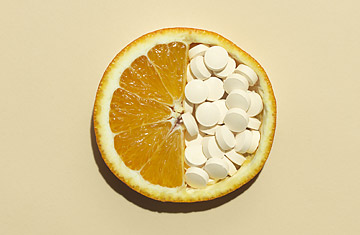
Vitamin-C pills don't fall into either category. Instead, they're part of the incredibly popular, poorly regulated world of dietary supplements
(3 of 4)
Then, in the 1960s, the biochemist Linus Pauling began advocating huge, controversial doses of vitamin C to prevent the common cold. Pauling — who had won two Nobel Prizes, one in 1954 for his chemistry research and one in 1962 for his antinuclear activism — had completed little rigorous research on the vitamin, but he had the makings of a guru. He was credentialed and yet elfin, sympathetic and yet persistent. Sales of vitamin-C pills exploded after his blockbuster book Vitamin C and the Common Cold appeared in 1970.
Pauling, who died in 1994 of prostate cancer at age 93, left a scientific legacy beyond his vitamin-C crusade: the Linus Pauling Institute at Oregon State University, which provides a steady stream of peer-reviewed research into whether and how nutraceuticals work. The institute also produces many of the young nutritional scientists who go to work for the research departments of nutraceutical companies. When I visited Usana's Salt Lake City headquarters in July, it was a former Pauling student, a molecular biologist named Brian Dixon, who met with me to review my lab results.
Dixon is 35, compact and extremely polite. He wore jeans to our meeting, and he was unguarded as he gave me a tour of Usana's labs and warehouses. Usana manufactures 90% of its products at the Salt Lake City headquarters, which produces more than 22 million tablets each week. Like several other big supplement companies, Usana sells its products, Avon-style, through networks of more than 200,000 independent distributors — husband-and-wife teams working from home, personal trainers looking for side money, unemployed people hoping for better. On my tour, I saw Usana's Wall of Fame, which is actually several walls along several hallways that display glossy head shots of the biggest vendors.
Dixon and I reviewed copies of my two lab reports, including the baseline results from January and the postregimen results from June. Each report showed 31 measurements, the first of which was "glucose, serum," a measure of my blood sugar: 83 milligram per deciliter (mg/dl) in January and 88 mg/dl in June, a change neither statistically nor medically significant. In fact, even after more than 3,000 pills and a daily diet of fiber powders and protein bars, little had changed. Two measures of my kidney health (values for blood-urea nitrogen and creatinine) were identical. Calcium, protein, sodium — none had varied much.
I asked two doctors to review my lab results: Braunstein at Cedars-Sinai and Stephen Dillon, my personal physician of 15 years. Both said only two of the values on my blood report had changed significantly. First, there was that 75% vitamin-D increase, which the two of them attributed to the vitamin-D3 supplement I had been taking (rather than to my spending more time outside). Second, my level of high-density lipoprotein (HDL) cholesterol — the good one — had leaped from 61 mg/dl in January to 89 mg/dl in June, an increase of 46%. Braunstein said he couldn't explain such a big surge. He pointed out that supplements that include niacin can amplify HDL cholesterol, but he suspected that my niacin dose of 40 mg per day was too low to account for such a large increase. Dillon speculated that the 2,000 mg of fish-oil concentrate I had been taking may have played a role.
I was frustrated by the lack of firm answers. When I asked Dixon what he thought about my HDL, he was careful. The FDA prohibits supplement companies from making unsupported health claims. "We make no representations that nutritional supplementation is a quick fix," he told me. "We just consider these nutritional supplements to be almost an insurance policy."
But health insurance of any kind isn't cheap. Usana billed Time more than $1,200 for the five-month supply of nutraceuticals I took. Braunstein said that for far less, Dillon could have done a simple blood test that would have shown my slightly-lower-than-normal vitamin-D level. I could have then started buying over-the-counter, generic vitamin-D tablets — and had money left over for a new gym membership.
O.K., but the supplements had also made me feel different — healthier, more robust. My blood hadn't changed, but a strong placebo response had occurred. I woke up every morning feeling vigorous in a way I hadn't in years. And that turned out to be a problem.
